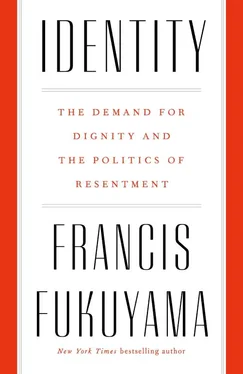This shift in literary sensibilities mirrored a deeper and more fundamental breakdown of moral consensus in Europe. The institutional church, which had defined the region’s moral horizon, came under increasing attack from Enlightenment figures such as Voltaire for its association with the predemocratic political status quo. But the underlying truth of Christianity was itself increasingly questioned, such as by the early nineteenth-century liberal theologian David Strauss, whose Life of Jesus suggested that the latter should be understood as a mere historical figure and not the literal Son of God. {5} 5 David F. Strauss, The Life of Jesus, Critically Examined (London: Chapman Brothers, 1846).
This trend culminated by the late nineteenth century in the thought of Friedrich Nietzsche, who granted that the Christian God once lived, establishing a clear moral horizon for European society. But God had since died with the breakdown of belief, leaving a moral void that could be filled with alternative values. Unlike traditional moralists Nietzsche celebrated this fact because it enormously expanded the scope for human autonomy: human beings were free not just to accept the moral law, per Luther and Kant, but to create that law for themselves. In Nietzsche’s thought, the highest form of artistic expression was value creation itself. The most supremely autonomous person was his figure Zarathustra, who could declare the revaluation of all values in the wake of the death of the Christian God.
Modern liberal societies are heirs to the moral confusion left by the disappearance of a shared religious horizon. Their constitutions protect individual dignity and individual rights, and that dignity seems to be centered on individuals’ ability to make moral choices. But what is the scope of those choices? Is choice limited to acceptance or rejection of a set of moral rules established by the surrounding society, or does true autonomy include the ability to make up those rules as well? With the decline during the twentieth century in Western societies of a shared belief in Christianity, different rules and values from other cultures began displacing traditional ones, as well as the option of not believing at all. Individual choice in areas outside of morals began to expand with the market economy and the general social mobility that it required: people could pick their occupations, marriage partners, domiciles, and brand of toothpaste. It seemed logical that they should have some choice in moral values as well. By the late twentieth century, the understanding of the scope of individual autonomy had broadened immensely in most modern democracies, leading to an efflorescence of what is sometimes termed expressive individualism. A clear line ran from Nietzsche’s work Beyond Good and Evil to the assertion by U.S. Supreme Court justice Anthony Kennedy, in the 1992 decision Planned Parenthood v. Casey , that liberty is “the right to define one’s own concept of existence, of meaning, of the universe, and of the mystery of human life.” {6} 6 Planned Parenthood of Southeastern Pennsylvania v. Casey, 505 U.S. 833.
The problem with this understanding of autonomy is that shared values serve the important function of making social life possible. If we do not agree on a minimal common culture, we cannot cooperate on shared tasks and will not regard the same institutions as legitimate; indeed, we will not even be able to communicate with one another absent a common language with mutually understood meanings.
The other problem with this expansive understanding of individual autonomy is that not everyone is a Nietzschean superman seeking to revalue all values. Human beings are intensely social creatures whose emotional inclinations drive them to want to conform to the norms surrounding them. When a stable, shared moral horizon disappears and is replaced by a cacophony of competing value systems, the vast majority of people do not rejoice at their newfound freedom of choice. Rather, they feel an intense insecurity and alienation because they do not know who their true self is. This crisis of identity leads in the opposite direction from expressive individualism, to the search for a common identity that will rebind the individual to a social group and reestablish a clear moral horizon. This psychological fact lays the groundwork for nationalism.
Most people do not have infinite depths of individuality that is theirs alone. What they believe to be their true inner self is actually constituted by their relationships with other people, and by the norms and expectations that those others provide. A person living in Barcelona who suddenly realizes her real identity is Catalan rather than Spanish is simply excavating a lower layer of social identity that has been laid down beneath the one nearer to the surface.
The politics of recognition and dignity had reached a fork by the early nineteenth century. One fork led to the universal recognition of individual rights, and thence to liberal societies that sought to provide citizens with an ever-expanding scope of individual autonomy. The other fork led to assertions of collective identity, of which the two major manifestations were nationalism and politicized religion. Late-nineteenth-century Europe saw the rise both of liberal and democratic movements demanding universal individual recognition and the more ominous emergence of an exclusive nationalism that would eventually trigger the world wars of the early twentieth century. In the contemporary Muslim world, collective identity is taking the form of Islamism—that is, the demand for recognition of a special status for Islam as the basis of political community.
This twofold directionality—toward universal recognition of individual rights, and toward collective recognition based on nation—was evident in the writings of Jean-Jacques Rousseau, who at different moments celebrated both the peaceful solitary dreamer and the martial general will. The two were present from the early days of the French Revolution itself, which flew two banners: a universal one promoting the Rights of Man that was indifferent to national borders, and a national French one that sought to defend the French patrie from invasion by foreigners. When the Revolution was hijacked by Napoleon, he pursued both goals simultaneously, using military power to spread the liberal Code Napoléon while imposing French suzerainty over the parts of Europe he conquered.
This dual character was present as well both in the Arab Spring and in Ukraine’s Revolution of Dignity. Millions of Arab citizens throughout the Middle East could sympathize with Mohamed Bouazizi, but not all of them wanted to live in a society that recognized the equal rights of all citizens, regardless of religion. Authoritarian regimes such as those of Zine al-Abidine Ben Ali in Tunisia and Hosni Mubarak in Egypt were equal-opportunity dictators, secularists suppressing not just Western-oriented liberals but Islamists as well. The advocates of a liberal successor regime contended with Islamists who sought a religious definition of national identity. When the Islamist Muslim Brotherhood took power in Egypt through democratic elections in 2012, they threatened to create a dictatorship of their own, leading the military to stage a coup in June 2013. Many former Egyptian liberals supported this takeover to prevent Egypt from becoming an Islamist republic.
Similarly, the Maidan Revolution of Dignity was based on a coalition of Western-oriented liberals who wanted Ukraine to join the European Union and become a normal European country. But they joined hands with Ukrainian nationalists from groups such as Right Sector, who sought to protect a separate Ukrainian cultural identity and were less interested in a liberal, open Ukraine.
We will return to the question of how individualist understandings of dignity and autonomy evolved in liberal societies over the past century in chapters 10 and 11. In the meantime, we will look more closely at two forms of collective identity, those based on nationalism and on religion.
Читать дальше












